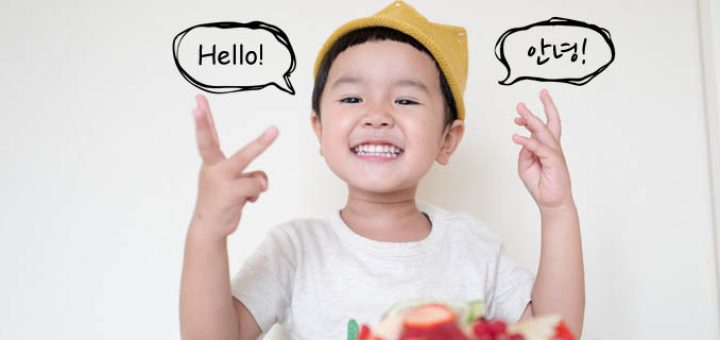On Raising a Bilingual Child

Benefits of Bilingualism
Beyond the obvious and practical benefits of bilingualism, such as being equipped to understand a whole new culture, studies have shown that being bilingual has many other benefits. For example:
- According to a 2004 study by psychologists Ellen Bialystok and Michelle Martin-Rhee, bilingual preschoolers had an advantage in solving mental puzzles over their monolingual peers.
- In a study of Cognitive gains in 7-month-old-bilingual-infants, it was found that, “Whereas both monolinguals and bilinguals learned to respond to a speech or visual cue to anticipate a reward on one side of a screen, only bilinguals succeeded in redirecting their anticipatory looks when the cue began signaling the reward on the opposite side.” Leading the scientists to state that bilingual babies have an enhanced cognitive control system well before the onset of speech.
- And in a study led by the neuropsychologist Tamar Gollan of the University of California, San Diego, it was found that bilingual adults were more resistant to onset of dementia and other symptoms of Alzheimer’s disease. If you need useful and comprehensive overview – look at this site. The degree of bilingualism was proportional to the amount of resistance.
The above are just some of the benefits. Fortunately for some children, bilingualism is simply a natural outcome of a multi-cultural upbringing.
My Story
I was one of those children who had a bilingual upbringing. I am a first generation immigrant and stepped on U.S. soil at the tender age of 7. I can still remember my first day of school, wide-eyed and not knowing a single word of English. I did not even know my ABCs. Then a year or so later, I was speaking English! I cannot even remember exactly when and how this happened. Recollecting those early years, I can clearly remember not even knowing how to ask for chocolate milk instead of regular milk (I love chocolate!). Then all of a sudden, I was feverishly carrying on a conversation with my friends in English.
Later in college I took a couple classes in linguistics and learned that children are designed to soak up language like a thirsty sponge. As we grow older, it gets more and more difficult to pick up new language and we start to lose this ability.
I absolutely love being bilingual. Language is the window through which we can truly appreciate a culture. You can appreciate a culture as much as you want, but without knowing its language, you cannot truly appreciate it. This is especially true of poetry and comedy. Many things just get lost in translation.
There is a common saying, “Don’t look down on others with a foreign accent. They know a whole new language (and culture) you don’t!”
Trials of a Bilingual Parent
I am a lot older than 7 now. And as a bilingual parent, living in a bilingual household, raising bilingual children, things are a bit more complicated and more challenging. Here is a common thought of many bilingual parents.
What if my kids speak neither languages well?!
I speak both Korean and English, but I am way better at English than Korean. My Korean is stuck at a 2nd grade level. And because of this, I sometimes wonder…
What if I am teaching my kids the wrong way to speak Korean?
The list goes on.
- “What if my kids can’t get along with other kids because they can’t speak English as well?”
- “Oh no! What if this affects their self-esteem because other kids make fun of them for not knowing English as well?”
- “Won’t they have a disadvantage in school because they don’t know one language [English] very well?”
My SO and I made the decision early on that we would only speak Korean at home so that our kids can communicate with their grand parents and can appreciate the Korean culture. So with my less than perfect Korean, I soldier on as a parent speaking a language in which I am less expressive because I do not command it as well as English.
As my kids approach school age, I have been trying to make a concerted effort to try to speak more English at home. However, an interesting thing happened. Although I am much more comfortable with English than Korean, it feels weird speaking English to my kids because we are so used to speaking in Korean, broken and less-than-perfect or not.
My kids also do not feel comfortable speaking English to me. My 2 year-old little girl is very talkative, in Korean. As soon as I speak English to her, her response 10 times out of 10 is, “Yah” in a tone that actually makes her sound like she knows what she is saying. You just have to hear the way she says it. The tone totally betrays the fact that she has no idea what I am saying. I ask, “Did you have a great day my cutie pie?” and she responds, “Yah.” “Are you sleepy?” “Yah.” “Do you know the answer to the universe and everything in between?” “Yah.”
So now that my son is about to enter kindergarten, I was worried. “Does he even know how to speak English? Will he know how to ask for chocolate milk?”
The Light
I am your typical parent. I worry. I worry a lot. While worrying about all this, I forgot to look in the mirror. Hey, I turned out ok! My parents did not even know how to speak English, and gosh darn it, I turned out ok! My kids at least have parents who are actually bilingual.
I am also lucky to live in a diverse community where the school system has recognized the benefits of bilingualism. Certain schools in the county offer something called an Immersion Program where the students are “immersed” in two languages. They spend 50% of the time in school in one language, and the other half in the other language. I was lucky enough to live near a school where they offered a “Korean Immersion” program. My son was chosen (through a lottery system) to be part of the program.
After speaking to the wonderful teachers at the school, I felt much better, assuaging many of my concerns. Indeed, there really are many benefits to bilingualism! And coincidentally, one of the parents in the program is a PhD in linguistics, so I asked if I should speak more English to my kids at home. His answer was no. I am paraphrasing,
Kids learn most of their language from their peers, not home. Even if you only speak Korean at home, the likely scenario is that he will forget the language as he grows older because we live in the United States where the entire culture runs on English. Don’t worry and continue speaking Korean to your kids.
One piece of statistic from the school was telling. Even with an “Immersion” program, the teachers said that as the kids advance in grade level, their Korean cannot keep up with English. Exactly for the same reason the linguist parent above mentioned.
So now I speak Korean to my kids without worrying that I am damaging their future. And I have to tell you, I am much better at saying certain things in one language than the other. For example, even though my English is much better, for some odd reason, I am much better at disciplining my kids in Korean than in English.
And lastly, on the first day of school I over heard a little boy speaking English in full sentences. I turned and my son and I made eye-contact as he shyly looked away. So he does know how to speak English! Just not in front of me!




